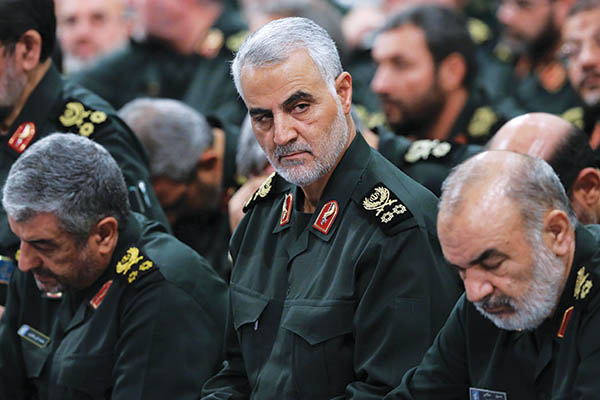
AFP
The head of the Revolutionary Guards’ Quds Force was targeted after a pro-Iran mob attacked U.S. embassy in Baghdad
Iranian commander Qassem Soleimani was killed early on Friday in a U.S. strike targeting Baghdad’s international airport, confirmed Tehran and Washington, in what is being seen as a massive escalation of tensions between the rivals.
The Pentagon said U.S. President Donald Trump ordered Soleimani’s “killing” after a pro-Iran mob attacked the U.S. embassy in Baghdad earlier this week.
Following Soleimani’s death, Trump tweeted an image of the U.S. flag without any further explanation. The U.S. had designated the Revolutionary Guards as a terrorist organization in April 2019.
The pre-dawn assassination marks the most major escalation yet in a feared proxy war between Iran and the U.S. on Iraqi soil.
Iran’s Supreme Leader Ayatollah Ali Khamenei warned that a “harsh retaliation is waiting” for the U.S. Iranian state TV carried a statement by Khamenei also calling Soleimani “the international face of resistance.” Khamenei declared three days of public mourning for the general’s death.
Reportedly, Soleimani was traveling in a convoy belonging to the Hashed al-Shaabi, an Iraqi paramilitary force with close ties to Iran, when it was hit by a volley of missiles. As reports of the Iranian leader’s demise spread, Iranian state television issued a statement by the Revolutionary Guard Corps saying Soleimani “was martyred in an attack by America on Baghdad airport this morning.”
The Hashed confirmed that both Soleimani and its deputy chief Abu Mahdi al-Muhandis were killed in the self-confessed “U.S. strike.”
“The deputy head of the Hashed, Abu Mahdi al-Muhandis, and head of the Quds Force, Qasem Soleimani, were killed in a U.S. strike that targeted their car on the Baghdad International Airport road,” it said.
The Hashed is a network of mostly-Shia armed units, many of whom have close ties to Tehran but which have been officially incorporated into Iraq’s state security forces. The units joined forces to fight the militant Islamic State group in 2014.
Iran’s foreign minister slammed Soleimani’s killing as a dangerous escalation and warned the United States would bear responsibility for the consequences. “The U.S.’ act of international terrorism, targeting and assassinating General Soleimani […] is extremely dangerous and a foolish escalation,” Javad Zarif wrote on Twitter. “The US bears responsibility for all consequences of its rogue adventurism,” he added.
Iran’s top security body called an urgent meeting on Friday over the “martyrdom” of Soleimani by the United States in Baghdad, semi-official news agency ISNA reported. “In a few hours, an extraordinary meeting of the Supreme National Security Council will be held to review the murderous attack on the vehicle of General Soleimani in Baghdad that lead to his martyrdom,” ISNA quoted its secretariat spokesman Keyvan Khosravi as saying.
U.S. officials, speaking on the condition of anonymity to AFP, said that Soleimani had been killed in a drone strike in Baghdad. Another official said it was aware of the possibility of an Iranian response and U.S. military officials were ready to defend themselves. The official did not rule out additional U.S. troops or military assets going to the region.
Democratic Senator Chris Murphy said while Soleimani was “an enemy of the United States,” the killing could put more Americans at risk. “One reason we don’t generally (assassinate) foreign political officials is the belief that such action will get more, not less, Americans killed,” Murphy said on Twitter. “That should be our real, pressing and grave worry tonight,” he said.
The Pentagon claimed Soleimani had been “actively developing plans to attack American diplomats and service members in Iraq and throughout the region.” It said it took “decisive defensive action to protect U.S. personnel abroad by killing Qasem Soleimani,” but did not specify how.
Phillip Smyth, a U.S.-based specialist in Shia armed groups, told AFP the strike would have “bigger” ramifications than the 2011 U.S. operation that killed Al Qaeda chief Osama bin Laden and the 2019 American raid that killed militant Islamic State group Abu Bakr al-Baghdadi. “In terms of a decapitation strike, what just happened is the most major decapitation strike that the U.S. has ever pulled off,” said Smyth. “There is no comparison,” he added.
The strike comes after an unprecedented attack on the U.S. mission in Baghdad. A mob of Hashed supporters surrounded the U.S. embassy on Tuesday over American airstrikes that killed 25 fighters from the network’s hardline Kataeb Hezbollah faction, which is backed by Iran.
The U.S. had acted in response to a rocket attack days earlier that had killed an American contractor working in Iraq. Trump had blamed Iran for a spate of rocket attacks targeting U.S. forces as well as the siege at the embassy, saying: “They will pay a very BIG PRICE! This is not a Warning, it is a Threat.”
